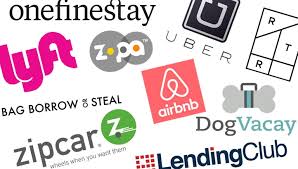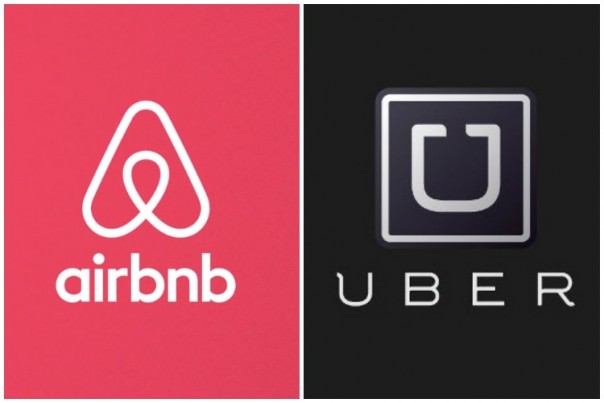List
Story > NEWS > Detail
[News] The Benefits of Shared Economic Platform
The business model of the shared economy is the structure of brokering the transactions of idle resources between individuals based on online platforms, and seeking profits in the form of brokerage fees or platform fees based on the performance of transactions. An important element of this model is the online platform, trust, and bottom-income model. Among them, the online platform is the online basis for the development of digital activities designed to allow three elements of sharing of goods, digital technology and profit-seeking to coexist simultaneously.

A typical form of customer-to-consumer (C2C) transactions, rather than transactions between operators and consumers, is the shared economy. In other words, the existing offline flea market used to sell idle resources, such as used products, came online, and transactions were made between individuals through the website or bulletin board. The concept of idle resources was extended to vehicle sharing system, residential and other personal services, and money, and expanded to the shared economy concept. The reason why the shared economy has evolved into a new business model is because many systems have been digitized as digital systems have spread throughout the economic sector. This changed the way that many people used to use the services provided by economic institutions and businesses to connect to consumers. Even if they are not professional taxi drivers or lodging businesses, the gap between professional and non-professionalism is breaking down.
In addition, the expansion of the shared economy market is accelerating further with the development of information and communication technology. With the development of the Internet, mobile and social network services (SNS), the new consumption pattern of pursuing "value in use" through rational consumption spread across the border into a new economic concept of a shared economy. The rapid development of social network technology has created a realistic chapter in which individuals can trade directly without intermediaries, and the intangible value of trust and reputation can become an important asset for individuals. It would have been very difficult to lend these idle resources to family members or close relatives even before the online platform appeared, but it would have been very difficult to lend them to strangers. It is difficult to trust whether the car will be returned intact after renting the house (Airbnb), whether the car will be returned intact (Relay Rises), and whether the lawn mower that was lent will be returned (Navergoods). The effort to individually verify credit and reliability to address these anxieties is a case in point of high transaction costs, which act as an impediment to exchanges.

Platform operators created a new market by significantly lowering transaction costs by introducing a reputation system that provides debt default insurance and encourages online behavior in order to reduce the number The online platform allows suppliers and consumers to come together to exchange information, goods or services and currency with each other. The platform creates the infrastructure that people who want to participate in a shared economic system can meet and provides them with tools and rules, enabling them to exchange values easily and in a mutually beneficial way. Because of these features, in less than a decade, the shared economic platform has become competitive and redefined the boundaries of industries in various industries.
Uber and Airbnb, the two leading shared economic platforms, are well-known as global giants in the oil business sector, with sales forecast to reach 335 billion won by 2025. According to a recent survey of adult populations in six major countries, 42.5 percent of the adult population used shared services over the past three years, and 30 percent of the adult population participated in shared economies as suppliers. About 40 percent of the adult population is willing to participate in the shared economy in the future, and the size of the shared economy is expected to increase gradually in the future. The revitalization of a shared economy based on an online platform increases the efficiency of society as a whole by increasing the value of idle resources and the relocation of resources, while consumers increase welfare in price, quality and diversity, which can affect the entire industry, not limited to the users of the shared economy.

In a newly established shared economy centered on an online platform, the presence of the platform will reduce the exploration and information costs for consumers to collect and find suppliers of goods or services they need, which will be expanded by active and active platform participation by platform users. The increase in the utilization (circulation rate) of objects such as vehicles, which are intangible assets, will reduce the cost of individual consumption, while the provision of services close to each user's consumption characteristics, such as temporary use, rather than purchases, will reduce the average total expenditure of users. In addition, the emergence of a shared economy will lead to price competition with suppliers providing sales or similar services, leading to overall market price declines. With the advent of a shared economy, consumers will be able to choose a shared service as an alternative to their purchases depending on their economic conditions or tastes, expanding the range of choices for consumers. Although the consumer must retain the item even though it is underutilized once it is purchased, the use of the shared platform will be limited to the required period of time, thereby reducing the sunk costs.
In a shared economy, suppliers generate a certain income by sharing their idle resources, transportation means and accommodations with other consumers, and especially when the shared economy platform itself is a model that shares labor, the provision of its own labor through the platform generates revenue. Idle resources will be utilized efficiently and individuals will be able to provide various services. The spread of this shared economy has the effect of increasing the total disposable income of each group of consumers, rather than the consumption of goods by ownership, at a time when consumption is reduced compared to production due to a long-term economic recession and deepening polarization. A shared economy plays a role in enhancing the productivity of the overall social economy by bringing about efficient utilization of idle resources, preventing inefficiency of resources as a whole, and increasing the market through meeting individual demand in niche markets. And the efficient use of resources creates a new lifestyle that can replace overconsumption and disposable culture.
The business model of the shared economy is the structure of brokering the transactions of idle resources between individuals based on online platforms, and seeking profits in the form of brokerage fees or platform fees based on the performance of transactions. An important element of this model is the online platform, trust, and bottom-income model. Among them, the online platform is the online basis for the development of digital activities designed to allow three elements of sharing of goods, digital technology and profit-seeking to coexist simultaneously.

A typical form of customer-to-consumer (C2C) transactions, rather than transactions between operators and consumers, is the shared economy. In other words, the existing offline flea market used to sell idle resources, such as used products, came online, and transactions were made between individuals through the website or bulletin board. The concept of idle resources was extended to vehicle sharing system, residential and other personal services, and money, and expanded to the shared economy concept. The reason why the shared economy has evolved into a new business model is because many systems have been digitized as digital systems have spread throughout the economic sector. This changed the way that many people used to use the services provided by economic institutions and businesses to connect to consumers. Even if they are not professional taxi drivers or lodging businesses, the gap between professional and non-professionalism is breaking down.
In addition, the expansion of the shared economy market is accelerating further with the development of information and communication technology. With the development of the Internet, mobile and social network services (SNS), the new consumption pattern of pursuing "value in use" through rational consumption spread across the border into a new economic concept of a shared economy. The rapid development of social network technology has created a realistic chapter in which individuals can trade directly without intermediaries, and the intangible value of trust and reputation can become an important asset for individuals. It would have been very difficult to lend these idle resources to family members or close relatives even before the online platform appeared, but it would have been very difficult to lend them to strangers. It is difficult to trust whether the car will be returned intact after renting the house (Airbnb), whether the car will be returned intact (Relay Rises), and whether the lawn mower that was lent will be returned (Navergoods). The effort to individually verify credit and reliability to address these anxieties is a case in point of high transaction costs, which act as an impediment to exchanges.
Platform operators created a new market by significantly lowering transaction costs by introducing a reputation system that provides debt default insurance and encourages online behavior in order to reduce the number The online platform allows suppliers and consumers to come together to exchange information, goods or services and currency with each other. The platform creates the infrastructure that people who want to participate in a shared economic system can meet and provides them with tools and rules, enabling them to exchange values easily and in a mutually beneficial way. Because of these features, in less than a decade, the shared economic platform has become competitive and redefined the boundaries of industries in various industries.
Uber and Airbnb, the two leading shared economic platforms, are well-known as global giants in the oil business sector, with sales forecast to reach 335 billion won by 2025. According to a recent survey of adult populations in six major countries, 42.5 percent of the adult population used shared services over the past three years, and 30 percent of the adult population participated in shared economies as suppliers. About 40 percent of the adult population is willing to participate in the shared economy in the future, and the size of the shared economy is expected to increase gradually in the future. The revitalization of a shared economy based on an online platform increases the efficiency of society as a whole by increasing the value of idle resources and the relocation of resources, while consumers increase welfare in price, quality and diversity, which can affect the entire industry, not limited to the users of the shared economy.

In a newly established shared economy centered on an online platform, the presence of the platform will reduce the exploration and information costs for consumers to collect and find suppliers of goods or services they need, which will be expanded by active and active platform participation by platform users. The increase in the utilization (circulation rate) of objects such as vehicles, which are intangible assets, will reduce the cost of individual consumption, while the provision of services close to each user's consumption characteristics, such as temporary use, rather than purchases, will reduce the average total expenditure of users. In addition, the emergence of a shared economy will lead to price competition with suppliers providing sales or similar services, leading to overall market price declines. With the advent of a shared economy, consumers will be able to choose a shared service as an alternative to their purchases depending on their economic conditions or tastes, expanding the range of choices for consumers. Although the consumer must retain the item even though it is underutilized once it is purchased, the use of the shared platform will be limited to the required period of time, thereby reducing the sunk costs.
In a shared economy, suppliers generate a certain income by sharing their idle resources, transportation means and accommodations with other consumers, and especially when the shared economy platform itself is a model that shares labor, the provision of its own labor through the platform generates revenue. Idle resources will be utilized efficiently and individuals will be able to provide various services. The spread of this shared economy has the effect of increasing the total disposable income of each group of consumers, rather than the consumption of goods by ownership, at a time when consumption is reduced compared to production due to a long-term economic recession and deepening polarization. A shared economy plays a role in enhancing the productivity of the overall social economy by bringing about efficient utilization of idle resources, preventing inefficiency of resources as a whole, and increasing the market through meeting individual demand in niche markets. And the efficient use of resources creates a new lifestyle that can replace overconsumption and disposable culture.



